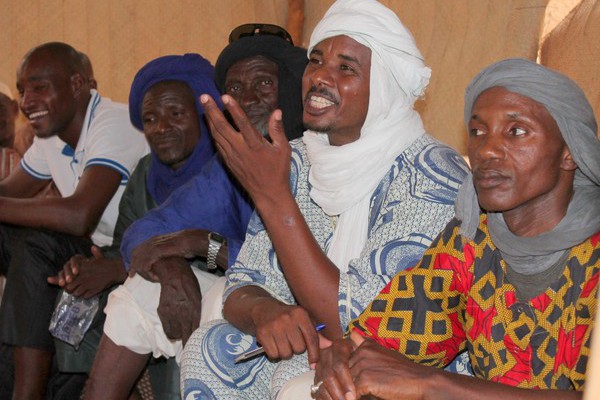At the beginning of 2012, Mali experienced an unprecedented political and security crisis. Since then, some steps have been taken to stabilize the country and restore peace, like the Algiers Peace Talks which resulted in an agreement. Nonetheless, it is largely admitted that significant efforts are still required to address the structural problems that triggered the 2012 crisis.
Interpeace has been working in Mali with its local partner, the Malian Institute of Action Research for Peace (IMRAP), since 2013. The overall objective of the programme is to contribute to the renewal of a will to live together in harmony and foster dialogue. Dialogue serves as a tool to jointly address challenges and opportunities for peace and social cohesion. Our approach seeks to (re)build bridges of understanding between social groups that would usually not talk to each other, due to geographic, cultural, ethnic, generational or other distances.
Interpeace and IMRAP engaged the Malian population in a national dialogue and research process. This allowed Malians to identify obstacles to and priorities for peace. More than 5,000 Malians from all walks of life have been consulted in all eight regions of Mali and refugee camps in Mauritania and Niger. Four major priorities for peace have been identified by the Malians: the erosion of societal values, the limitations in access to employment for youth, the failure of governance, and the chronic insecurity.
The findings of this inclusive and participatory research have been published in a reportage et un film called 'Self-Portrait of Mali on the Obstacles to Peace'. The Self-Portrait is a remarkable example of the capacity of Malians to analyze their own situation and their commitment to this unique dialogue process. The next step of the programme will focus on finding consensual solutions to the priorities for peace. This process will be guided by key experts, opinion leaders and decision-makers to ensure that solutions draw on best practices and experience. At the same time, the continued national dialogue process will ensure the participation and buy-in of Malian society.
Since 2017, there has been a strong initial Track 6 engagement within the Security and Defense apparatus. Military authorities have adhered to and lent their support to Interpeace and IMRAP’s initiatives. IMRAP has acquired a truly unique position in Mali, both in terms of its access and the trust it managed to develop with Defense and Security forces – from top levels to foot soldiers – as well as with communities affected by insecurity. Moreover, Interpeace is becoming the main point of reference in Mali regarding conflict sensitive programming. With the support of Interpeace’s West Africa Office, Interpeace’s International Peacebuilding Advisory Team (IPAT) trained MINUSMA staff in a context of a growing pressure on international actors in Mali to adapt their programming to be more conflict sensitive.
In 2019, the programme will a). carry out participatory processes to identify obstacles to peace in the Mopti and Gao regions, to support locally-led solutions; b). support the participation of women in the peace process and in the security and defence apparatus; c). strengthen the engagement between Mixed Patrols and communities in Gao in Timbuktu; and d). continue ensuring a strong and growing Track 6 engagement with the Security and Defence apparatus.
See the list of publications developed by Interpeace and IMRAP from 2015 - 2018 Cliquez ici.

